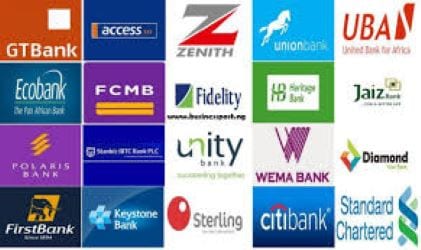Eleven (11) Nigerian banks listed on the Nigerian Exchange Limited (NGX) has generated a total of N288.71 billion from electronic banking fees in the first half of the year, findings by naijabusiness.com.ng reveals.
The breakdown of the different financials released by the leading banks on the local bourse showed a significant increase in the electronic banking fees recorded by most of the commercial banks surveyed. This is coming amid different complaints from customers regarding excessive charges by banks on some of its digital channels.
It is pertinent to note that electronic banking revenues are generated through various digital transactions utilized by the customers of a bank. The revenue is spawned through fees and commissions gotten through transactions like mobile applications, Automated Teller Machines (ATM), USSD channels, internet banking, Point of Sales (POS) payments, and agency banking.
With the exception of Union Bank that recorded a decline of about 3% Year-on-Year in its electronic banking revenue to N3.55 billion as of June 2021, ten (10) other banks tracked by naijabusiness.com.ng, all recorded positive growth in their electronic banking fees.
Checks into the financials of the listed banks indicate that the growth in electronic banking fees also impacted the overall fee and commission income of a large number of the banks surveyed. It is striking to note that this growth is coming on the back of a slew of stiffer competition posed by challenger banks such as V-Bank and Kuda Bank, which have in recent times attracted significant funding and expanded their capital base. These banks offer zero fees as an attractive selling point which they hope will sway customers from the big commercial banks.
While this growth in the numbers might look good in the books or financial records of the banks, analysts fear that it might negatively impact the financial inclusion drive by the government, especially as relates to affordability by those at the risk of being financially excluded.
Recent data earlier released in June by Enhancing Financial Innovation & Access (EFInA) revealed that about 38 million adults translating to 36% of the total adult population in Nigeria were financially excluded by the end of 2020. This figure is pretty above the revised National Financial Inclusion Strategy targets of 20% for the aforementioned period. As the Central Bank of Nigeria (CBN) targets a 95 percent financial inclusion rate of Nigerians going into 2024, it is therefore imperative to ensure that some of these digital innovations and services built to enhance financial inclusion are subsidized to attract more people into the inclusion net, otherwise the goal of leveraging technology to drive financial inclusion would be defeated.
Industry comparison
As usual, the big boys or the elite banks, usually referred to as FUGAZ-(First Bank, UBA, GTB, Zenith and Access) generated the highest amount from electronic banking during the period under review.
While Access Bank led the pack with N29.91 billion, UBA followed closely with N29.6 billion, First Bank also made N28 billion, while Zenith and GT completed the elite list with the sums of N17.05 billion and N10.5 billion respectively.
On the other hand, in the bottom five were; Wema Bank with N1.22 billion, Unity Bank with N1.57 billion, Stanbic IBTC with N1.62 billion, Union with N3.55 billion and Sterling with N3.6 billion.

